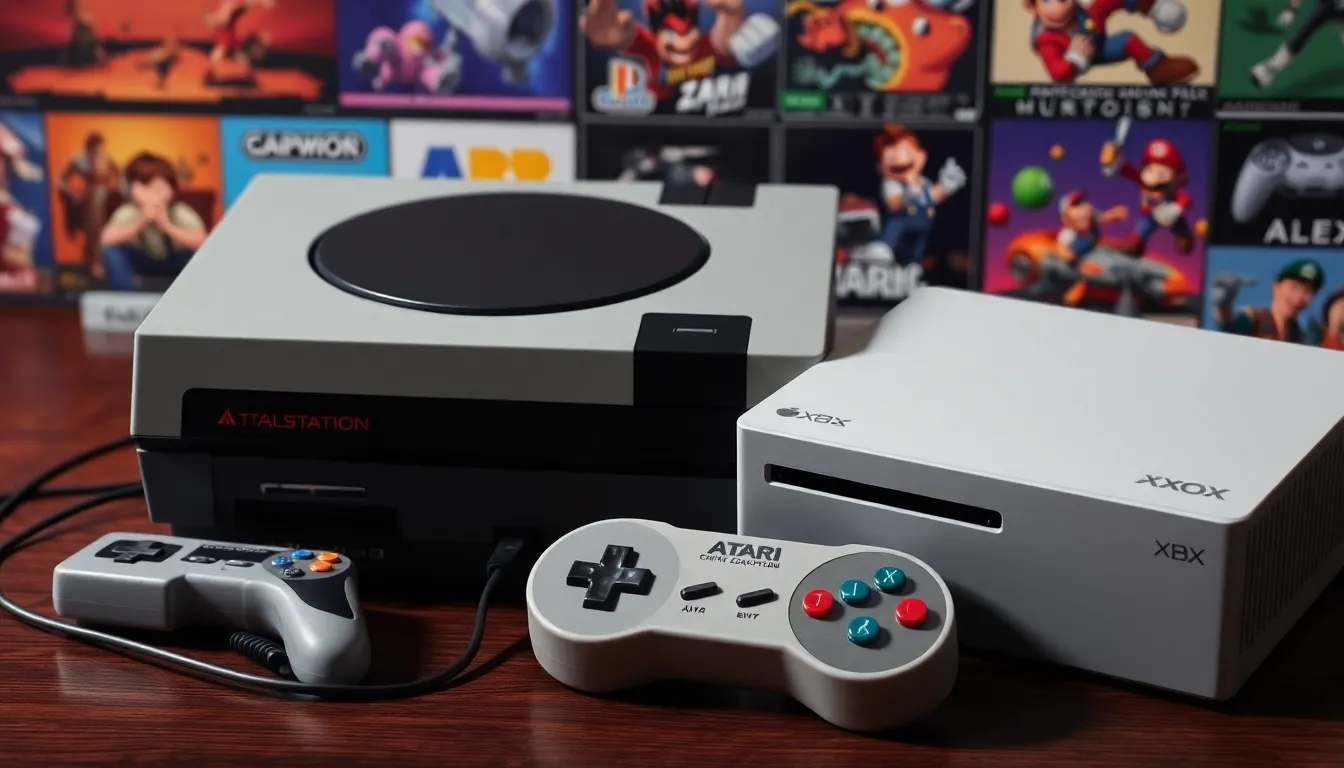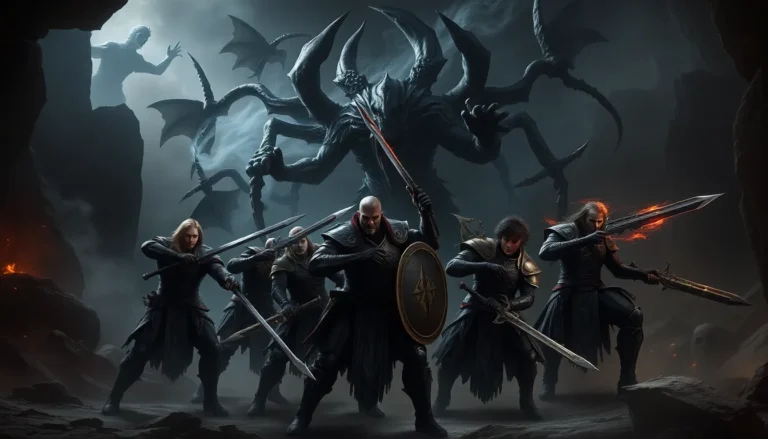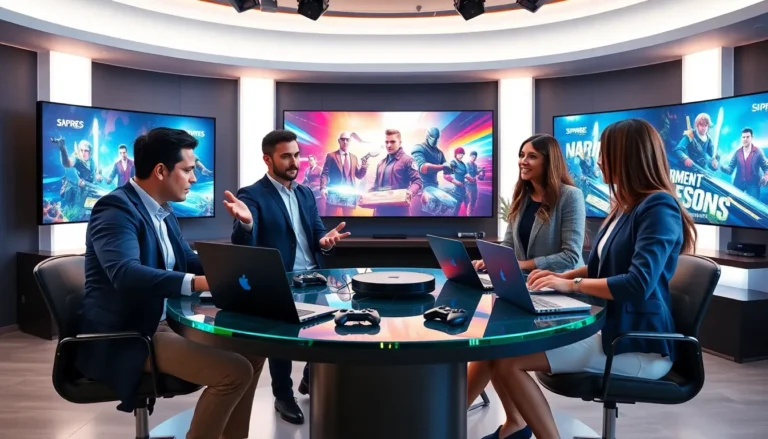In the world of gaming, few topics ignite passion quite like the console war debates. Gamers have long been divided into camps, fiercely defending their beloved consoles like knights in shining armor. Whether it’s the PlayStation, Xbox, or Nintendo, each faction boasts its own loyal followers ready to engage in epic showdowns over exclusive titles and hardware superiority.
But let’s be real: these debates often resemble a playful family feud rather than a serious clash of titans. With memes flying and insults hurled, the console wars are as entertaining as they are intense. So grab your controllers and prepare for a deep dive into this colorful battleground where opinions clash and friendships are tested—all in the name of gaming glory. Who will emerge victorious, and who will be left to sulk in the corner?
Table of Contents
ToggleOverview of Console War Debates
Console war debates focus on the rivalry among gaming platforms like PlayStation, Xbox, and Nintendo. Fans engage in these discussions with immense passion, often debating specifications, exclusives, and performance. Memes and humorous content frequently accompany these arguments, showcasing the playful aspect of competition.
Interactions in forums and social media reveal how deeply entrenched brand loyalty can be. Players often highlight their favorite platform’s advantages, such as exclusive titles or superior graphics. These discussions sometimes escalate, resembling a friendly feud more than a serious conflict.
Evolving technology constantly alters the landscape, influencing opinions. New releases and updates prompt debates about which system reigns supreme, reflecting gamers’ desire to stay on the cutting edge. These dynamics lead to ongoing conversations about user experience, ecosystem, and online services.
Community events and tournaments tend to ignite fierce loyalty, bringing fans together in support of their chosen platforms. Players gather to celebrate their preferences, reinforcing bonds within the community, even as rivalries persist.
With each console generation, the debates evolve, integrating new features and gaming trends into the discussions. Companies engage in marketing strategies to attract fans, often fueling friendly banter. These competitive conversations continue to thrive, showcasing the allure of the gaming universe.
Historical Context

Gaming console debates have roots that trace back to the late 20th century. The birth of modern consoles marked a significant turning point for the gaming industry.
The Birth of Modern Consoles
In 1972, Atari released the first commercial home video game console, sparking interest in home gaming. The introduction of the Nintendo Entertainment System (NES) in 1985 revitalized the industry after the crash of 1983. Sony entered the market with the PlayStation in 1994, revolutionizing gaming with 3D graphics and CD-ROM technology. Microsoft followed with the Xbox in 2001, emphasizing online multiplayer capabilities. Each new generation not only introduced advanced technology but also led to fierce competition among fans.
Key Players in the Console Market
Microsoft, Sony, and Nintendo dominate the current console market. Sony’s PlayStation series offers an expansive library of exclusive titles, attracting dedicated players. Xbox focuses on online services like Game Pass, appealing to those who prioritize digital gaming. Nintendo’s innovative gameplay and family-friendly titles build strong brand loyalty among diverse audiences. Each company’s unique strengths foster ongoing debates about performance, innovation, and overall gaming experience.
Major Console War Debates
Console wars showcase the intense rivalries that define the gaming landscape. These debates highlight the passion of players dedicated to their platforms.
The 16-Bit Era
The 16-bit era in the early 1990s marked a significant turning point. Sega Genesis and Super Nintendo Entertainment System (SNES) led the charge, each boasting unique titles. Sega’s aggressive marketing tactics and memorable mascot Sonic the Hedgehog drew attention. In contrast, SNES offered iconic games like Super Mario World and The Legend of Zelda: A Link to the Past. Players passionately defended their choices, cementing brand loyalty in the process. Fan forums buzzed with discussions on graphics quality and gameplay innovation, showcasing the emergence of console war culture.
The Console Wars of the 2000s
The 2000s ushered in a new generation of console competition. Microsoft’s Xbox, Sony’s PlayStation 2, and Nintendo’s GameCube vied for market dominance. PlayStation 2 quickly became the best-selling console of all time, boasting a vast library of titles. Xbox introduced online gaming with Xbox Live, a groundbreaking feature for multiplayer interactions. GameCube attracted younger audiences with its family-friendly lineup, including Super Smash Bros. Melee. Debates throughout this era revolved around graphics, online capabilities, and exclusive games. Players fiercely argued the merits of each system while brands continuously evolved to capture gamer interest.
Impact on Gaming Culture
Console war debates shape gaming culture in significant ways. Strong community divisions emerge as fans passionately defend their platforms.
Community Divisions
Passionate discussions often lead to polarized communities, where console loyalty defines social interactions. Gamers frequently associate with others who share their platform preference, creating distinct online and offline spaces. Rivalries can escalate, sparking memes and lighthearted banter. These interactions cultivate in-group dynamics, allowing individuals to bond over shared experiences and games. Events like tournaments amplify these divisions, as fans rally together, cheering for their favored consoles. Social media serves as a battleground for these debates, highlighting the fervor that defines each community. Ultimately, the division between groups reinforces both rivalry and camaraderie among gamers.
Influence on Game Development
Game developers pay close attention to console wars when creating new titles. Competition drives innovation, with studios crafting exclusive content tailored to specific platforms. Players expect high-quality graphics and engaging gameplay, pushing developers to enhance their offerings. Each major console company influences development timelines, leading to strategic partnerships for exclusive releases. Developers weigh factors like player feedback and console capabilities, impacting game mechanics and features. Rivals inspire advancements in technology, increasing the overall quality of titles available on all platforms. Console wars thus become a crucial catalyst for gaming innovation, enhancing the player experience across the industry.
Current Trends in Console Wars
Console wars continue to evolve with emerging trends that capture gamers’ interests and reshape the competitive landscape.
Next-Gen Consoles
Next-gen consoles like PlayStation 5 and Xbox Series X represent the latest advancements in gaming technology. These platforms enhance performance with 4K graphics and faster load times. Gamers discuss exclusive titles like Ratchet & Clank: Rift Apart and Halo Infinite, each showcasing the unique strengths of their respective systems. Continued interest in virtual reality and cloud gaming also influences how developers approach new releases, driving innovation. Both Xbox and PlayStation emphasize backward compatibility, allowing players to enjoy previous-generation titles, which further influences their buying decisions.
Streaming Services vs. Traditional Consoles
Streaming services like Xbox Cloud Gaming and PlayStation Now challenge traditional consoles by offering accessibility and convenience. Gamers can access extensive libraries without the need for hardware upgrades. This shift toward streaming creates debates about the future of physical consoles and how game quality holds up online. While many appreciate the ease of instant access, others argue that latency and visual fidelity remain concerns. Moreover, subscription models incentivize players to explore diverse titles, sparking discussions about the long-term sustainability of this approach in the console market.
The console war debates continue to shape the gaming landscape in vibrant ways. As players passionately defend their platforms the spirit of competition thrives. This rivalry not only fuels brand loyalty but also drives innovation within the industry. Gamers are drawn together through shared passions and spirited discussions which enhance their overall experience.
With each new generation of consoles the stakes rise higher. The ongoing evolution of technology and gaming experiences promises to keep the debates alive. As the gaming community navigates trends like cloud gaming and subscription services the future of console wars remains as exciting as ever. Ultimately these debates reflect the dedication and enthusiasm that gamers bring to their favorite platforms.





